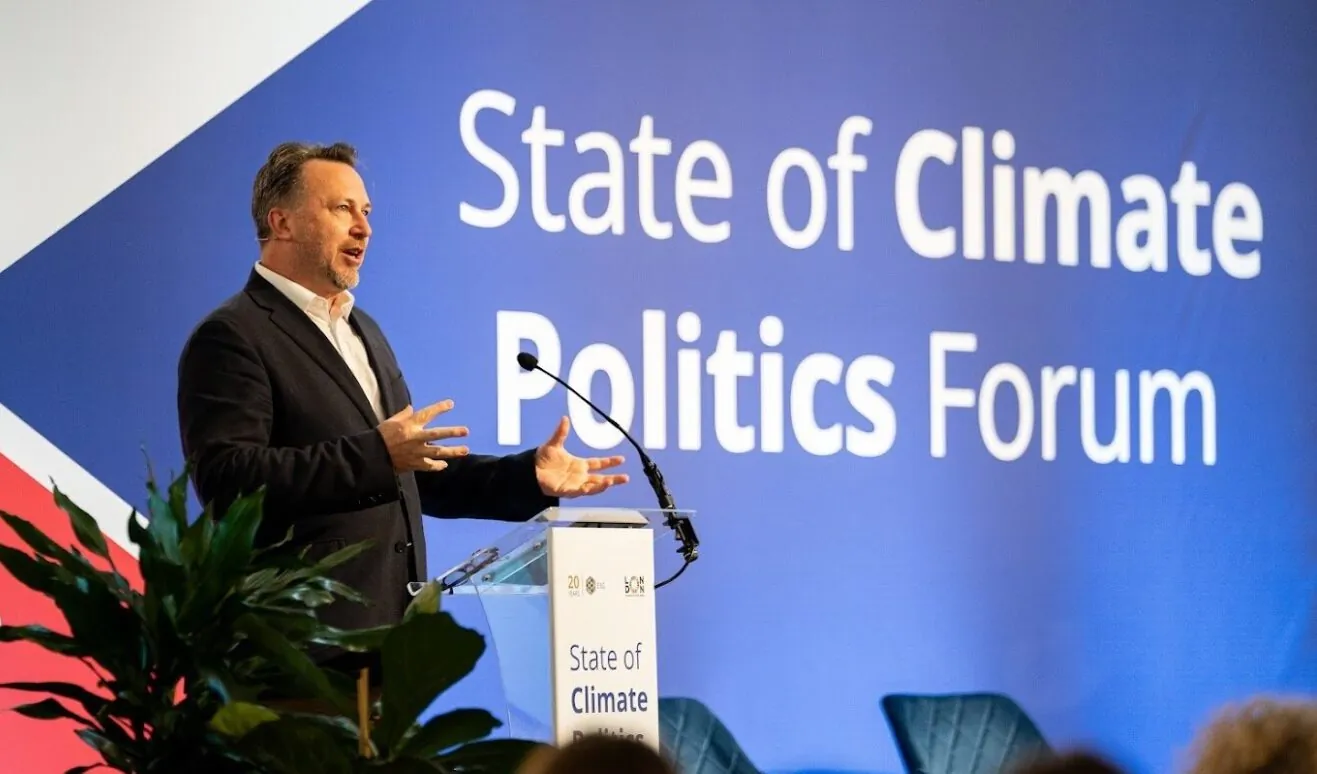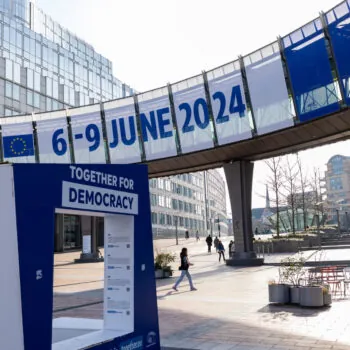This an edited version of remarks given by Nick Mabey, founding director and co-CEO, E3G, at the inaugural E3G State of Climate Politics Forum, held on the 25 June 2024 as part of London Climate Action Week
In his speech, Nick explores why E3G was founded to bridge the gap between climate policy and practical politics; the barriers to change we are experiencing in today’s current political environment, the need for tackling the climate politics gap, why climate politics is different, and how we deliver climate statecraft through the ‘art of the necessary’.
Watch the recording of Nick’s speech
Two decades of E3G
E3G was founded 20 years ago with the mission of driving faster climate action by bridging the gap between climate policy and practical politics. See more about E3G’s story.
The motivation for founding E3G was simple. We believed that the main barriers to effective climate action are not economic or technological but political and institutional and wanted to create new analysis, tools and approaches to effectively tackle these problems.
As founders, then working in the UK government, we saw too many clever climate policy proposals fail because they ignored the political context and need to assemble a broad coalition of support for change. The response of climate experts to failure was to blame politicians for lacking political courage or leadership – which was sometimes true – rather than reflecting on how to design solutions that would make the politics more tractable.
The main barriers to effective climate action are not economic or technological but political and institutional.
Nick Mabey
Over the last two decades, E3G has worked with partners to produce better policies and political strategies through in-depth analysis of the political economy of climate action in almost 30 countries covering 73% of the world’s greenhouse gas (GHG) emissions.
Firstly, we used this analysis to inform climate diplomacy & negotiations, but quickly the scope of work expanded to analysis to underpin political strategies for national climate ambition and net zero, coal phase out, financial reform, increasing energy efficiency, managing just transitions and countering environmental backlash.
Political barriers to change
One conclusion from this two decades of work is that as clean technologies had become cheaper and better, political barriers to change have become increasingly more important.
This can be demonstrated with a few numbers, because climate politics is always about the numbers.
Keeping climate change to around 1.5C is estimated to directly “cost” under 1% of GDP globally and is economically positive in many energy importing countries. This number is continuing to fall as technologies improve.
First round damages from uncontrolled climate change are very conservatively estimated at around 25-35% of global GDP by 2100. This does not include any accounting for climate driven instability or conflict. As most major emitters spend 30-60% of GDP on public services and security, climate action looks like a very good value – if somewhat marginal – investment in the public good.
But that isn’t the full story. Just because stopping climate change is cheap doesn’t mean it is easy.
Reaching net zero requires fundamental reform of energy, industrial, urban, transportation and agricultural systems in all countries in two decades. Shifting $90 trillion in infrastructure investment to new clean and resilient solutions in the next 15 years. Moving business from incumbent industries to insurgent solutions which could well be produced in different countries. This is not just an issue for fossil fuel exporting countries, but as current disputes over Chinese EV exports show, for all countries producing fossil-based products.
Just because stopping climate change is cheap doesn’t mean it is easy.
Nick Mabey
Compared to the investment in driving clean technology the world has massively underinvested in building the capacity to understand, and capability to construct, the political conditions needed to deliver this radical transformation at the pace required.
Tackling the climate politics gap
E3G has been undertaking a programme of investment to help remedy this “climate politics gap” by building a stronger practitioner community and more robust debate around climate politics. One part of this has been trying to develop a clearer understanding of the core elements of climate politics.
In many ways climate politics is the same as normal politics. It is about understanding who wins and who loses. Who has influence and who is ignored. And how to use this information to build new winning coalitions for driving and sustaining the change you want to see.
It involves passionate arguments over both the objectives and means of policy. It pits incumbent forces against disrupters and revolutionaries.
At under 30 years old, climate action is still a new political project compared to the fights over how to secure and distribute the benefits of industrial development which have dominated politics for nearly 200 years.
The climate issue has matured from a relatively niche environmental and scientific debate into a global economic and ecological transformation. A transformation whose successes, and failures, are now directly affecting everyone on the planet and are at the centre of almost all political debates and disputes. Even when the participants don’t know it.
But from our analysis we can see that the political debate on climate change in most countries has lagged far behind its physical and technological reality.
Partly this is because the climate community emerged from outside mainstream political parties and processes, is unfamiliar with how they work and often lacks established networks of influence.
The difference with climate politics
But this is also because climate politics is fundamentally different from “traditional” politics in four critical ways:
- Climate stability is a true public and global interest: although some are more vulnerable than others and some benefit more from fossil status quo, no-one can survive a fully destabilised climate. Whether they are a petro-state or a low-lying developing country. Polling shows this realisation is reflected in majority public opinion everywhere.
Climate politics revolves not over whether climate change is happening, but around how much climate risk “we” should take. When “we” are a diverse set of countries with different interests and different groups inside countries with very vulnerabilities to net zero transitions and climate impacts. In turn the level of climate risk considered acceptable determines how fast we need to eliminate fossil fuels. The Paris Agreement is unique in that all countries agreed to a threshold for dangerous climate change and took legal responsibility to act in a way that did not exceed it. What countries failed to agree was who should be responsible for what action, and how much help richer and higher polluting countries should give to more vulnerable and poorer ones. These issues will be at the heart of climate geopolitics especially over the next 18 months as we head into the end of the next 5-yearly Paris ambition cycle. - The Pace of Change Matters: if we pass specific climate system thresholds – which firmly exist but whose thresholds remain scientifically uncertain – there is no realistic way to restore a stable climate on human timescales. Winning slowly on climate is losing. This is not true for “normal” political problems like inequality, poverty and economic competition. It is more analogous to hard security threats and the Mutually Assured Destruction of the Cold War era. This means that even incremental delays from political opposition must be resisted as they could be literally fatal. There is little space for political compromise on ultimate climate goals – especially for the most vulnerable – which reduces the space for political agreement.
- Losing while Winning: it looks like global fossil emissions could peak this year, an amazing and empowering example of what collective human action can achieve. But climate impacts will continue worsening until we reach net zero emissions – hopefully by mid-century. It will become harder and harder to hold global and local coalitions together as the disruption and volatility of net zero transitions grow but at the same time so do climate impacts. Surviving this period will requires building unprecedented international and “whole of society” coalitions for action which are sustained over decades.
- Change Everywhere all at Once: to meet the Paris goals all G20 countries need to agree to peak emissions before 2030. This will require unprecedented global cooperation at a time when geopolitical tensions are rising between the largest global emitter and the world’s biggest fossil fuel producer: China and the USA.
Delivering climate statecraft, and the art of the necessary
Climate politics is normal politics and then some. If normal politics is the art of the possible. Climate politics needs to be the art of the necessary.
All political families and foreign policy traditions will need to adjust to the new climate realities.
Nick Mabey
These differences also mean that climate action sits uncomfortably with traditional political families. It is too state directed and interventionist for many conservatives. Too disruptive of existing industries and communities for many on the left and especially for some unions. Too fiscally disruptive and behaviourally intrusive for classic liberals.
Libertarians just want it to go away as it destroys their foundational argument for a minimal state. The revolutionary left dislikes the compromises that must be made with existing industries and capitalism to achieve rapid change. The nationalist and far right object to the need for global cooperation and engagement.
To deliver necessary climate statecraft, foreign policy realists will have to adjust the scope of what they consider reality and country interests. Idealists will need to adjust to the need for transactional agreements to achieve practical action even when they go against the principles of international law. Isolationists cannot protect themselves from climate impacts from outside, and internationalists must acknowledge the need to secure borders and protect economies from the fundamental stresses caused by net zero transitions and climate impacts.
All political families and foreign policy traditions will need to adjust to the new climate realities. And this is a real fight. Not all approaches to climate action will work and the climate system doesn’t reward effort just concrete outcomes that control emissions at the pace needed.
Climate policies can also be designed that are unequal, exclusionary, authoritarian, divisive and exploitative. This is morally wrong and probably also politically unsustainable.
The good news is that most political families have historically shown ideological flexibility in the face of historical forces like climate change. Conservatives changed in the wake of the 1920’s great depression and post-war reconstruction. Social Democrats shifted in the wake of the 1970’s oil crisis and stagflation.
Climate issues are central to the core issues of current politics: geopolitical competition, autocracy vs democracy, the rise of populism, tackling inequality and poverty and rebuilding public trust in national and international institutions.
But climate politics is also different. Politics that requires us to understand ecological dynamics alongside social forces. That requires fundamental mobilisation of our economies towards a public goal outside the pressures of wartime or upheaval of revolutionary change. That needs us to build coalitions between and within countries that can sustain radical action over decades not just to win the next election.
There is a need to build much stronger and deeper conversations between practitioners, analysts, commentators and activists to explore how to achieve our common goals and overcome political barriers to achieving a safe climate for all.


